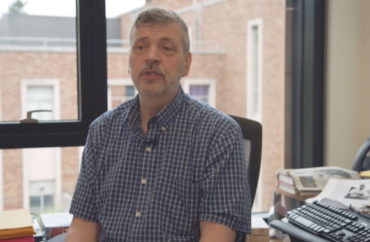
If the case fails, professors could be ‘punished for speaking their minds,’ scholar says.
Free speech groups are coming to the defense of University of Washington Professor Stuart Reges over an ongoing lawsuit regarding a controversial land acknowledgment statement.
Five organizations, including the James G. Martin Center for Academic Renewal, recently filed friend of the court briefs supporting the professor’s appeal after a lower court ruled against him.
The center’s George Leef told The College Fix in a recent email that this case will determine the trajectory of free speech on campuses in the future.
“This case is important because if the university’s conduct is allowed to stand, it sets a precedent that professors can be punished for speaking their minds whenever school administrators can come up with a pretext,” said Leef, a former faculty member at Northwood University in Michigan.
Others that filed briefs in support of Reges were PEN America, the Pacific Legal Foundation, Students for Liberty, and the Manhattan Institute, according to a news release from the Foundation for Individual Rights and Expression.
The College Fix reached out to attorney Joshua Bleisch from FIRE, a legal group that defends fundamental rights on college campuses, for an update on the case.
“Right now, the case is in the middle of briefing before the U.S. Court of Appeals for the Ninth Circuit,” Bleisch said in a recent email.
This briefing follows a ruling from a district court in May, which dismissed the professor’s constitutional claims against the university’s nondiscrimination policy.
Bleisch said the lawsuit argues the policy is “vague and overbroad.”
“The trial court also granted summary judgment for the university on Reges’ retaliation and viewpoint discrimination claims,” Bleisch said.
Professor Reges (pictured) filed the lawsuit after he said the university punished him for including a controversial land acknowledgment statement on his syllabus.
“A small group of activists are trying to limit the range of ideas that can be expressed on campus,” Reges told The Fix previously, when he filed the lawsuit in 2022.
The public university recommended every professor include a land acknowledgement on their syllabi. A land acknowledgment statement is a formal recognition of indigenous peoples who have historically inhabited the land where an event or activity is taking place.
The university suggested: “The University of Washington acknowledges the Coast Salish peoples of this land, the land which touches the shared waters of all tribes and bands within the Suquamish, Tulalip and Muckleshoot nations.”
Reges, a computer science professor, offered his own version: “I acknowledge that by the labor theory of property, the Coast Salish people can claim historical ownership of almost none of the land currently occupied by the University of Washington.”
His “parody” land acknowledgement sparked outrage by a handful of students and staff, according to FIRE.
The university took several actions in response, including encouraging students to file complaints and to sign up for a new section of the course offered by another professor, FIRE’s news release states.
University leaders also began a year-long investigation of the professor, the release states.
MORE: Professor demands free speech in ‘battle for the soul of the university’
UW spokesperson Victor Balta expressed satisfaction over the district court ruling in favor of the university.
“The trial court’s decision made clear that the removal of Stuart Reges’ anti-inclusive land acknowledgment from a Winter 2022 course syllabus in response to the disruption and difficulties it caused to students, faculty, and staff was legal and appropriate,” Balta told The Fix in a recent email.
However, Balta also expressed concern that the court’s decision did not end the lawsuit completely.
“We were hopeful that decision would have put an end to his meritless legal action, and it is disappointing that more state and taxpayer funds will need to be spent responding further,” Balta said.
While UW is grateful for the court’s decision, others worry that the ruling could pave the way for further attacks on the First Amendment.
When asked about the likelihood of the ruling being overturned, Leef with the James G. Martin Center told The Fix he was not sure.
“We … are hopeful that the appellate court will uphold the First Amendment right of faculty members to speak without fear of retaliation,” he said.
Attorney Bleisch with FIRE said the trial court’s ruling could encourage future encroachments on free speech if it is not overturned by the Ninth Circuit.
“As is, that bad ruling would allow public colleges and universities to use mere complaints of offense as the basis for punishing faculty,” Bleisch told The Fix in an email.
MORE: University censors professor’s syllabus for controversial land acknowledgement
IMAGE: FIRE/YouTube
Like The College Fix on Facebook / Follow us on Twitter






Please join the conversation about our stories on Facebook, Twitter, Instagram, Reddit, MeWe, Rumble, Gab, Minds and Gettr.